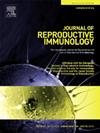孟德尔随机化揭示了细胞因子与男性生殖疾病之间的因果关系
IF 2.9
3区 医学
Q3 IMMUNOLOGY
引用次数: 0
摘要
本研究旨在通过双样本孟德尔随机化(MR)方法,探讨细胞因子与四种男性生殖疾病,即精子异常(AS)、男性不育、勃起功能障碍(ED)和前列腺增生(HP)之间的因果关系。与男性生殖疾病的遗传关联来自IEU OpenGWAS项目,来自两个GWASs的细胞因子数据侧重于人类蛋白质组和细胞因子。使用方差反加权、MR-Egger回归、加权中位数、加权模型和简单模型得出估计。此外,研究结果的稳健性通过Cochran’s q检验、MR-Egger回归和留一敏感性分析进行了评估。15种独特的细胞因子被确定为与四种男性生殖障碍的风险有因果关系。具体而言,对于AS,白细胞介素22 (IL-22)、IL-12和巨噬细胞迁移抑制因子与AS呈负相关,而肿瘤坏死因子β水平与AS呈正相关。在男性不育的情况下,IL-2受体拮抗剂水平、IL-34和粒细胞集落刺激因子水平与男性不育呈正相关,而IL-21呈负相关。在ED方面,IL-19、IL-1β和eotaxin水平与ED风险呈负相关,而巨噬细胞炎症蛋白1β (MIP-1β)水平和干扰素γ诱导蛋白10水平与ED风险呈正相关。对于HP,基质细胞衍生因子1α和MIP-1α水平与HP呈负相关。总之,这项MR分析揭示了几种细胞因子与男性生殖疾病的因果关系,并可能为进一步研究细胞因子相关男性生殖疾病的机制和临床研究提供新的见解。本文章由计算机程序翻译,如有差异,请以英文原文为准。
Mendelian randomization reveals causal relationships between cytokines and male reproductive diseases
This study aims to explore the causal links between cytokines and four male reproductive disorders, namely abnormal spermatozoa (AS), male infertility, erectile dysfunction (ED), and hyperplasia of prostate (HP), employing a two-sample Mendelian randomization (MR) approach. Genetic associations with male reproductive diseases were derived from the IEU OpenGWAS project, with cytokine data from two GWASs focused on the human proteome and cytokines. Estimations were derived using inverse variance weighting, MR-Egger regression, weighted median, weighted model, and simple mode. Furthermore, the robustness of the findings was evaluated through Cochran’s Q-test, MR-Egger regression, and leave-one-out sensitivity analysis. Fifteen unique cytokines were identified as having causal relationships with the risk of four male reproductive disorders. Specifically, for AS, interleukin-22 (IL-22), IL-12, and macrophage migration inhibitory factor were negatively correlated with AS, while tumor necrosis factor β levels were positively correlated with AS. In the context of male infertility, IL-2 receptor antagonist levels, IL-34, and granulocyte-colony stimulating factor levels were positively linked to male infertility, whereas IL-21 showed a negative relationship. Regarding ED, IL-19, IL-1β, and eotaxin levels were negatively associated with ED risk, while macrophage inflammatory protein 1β (MIP-1β) levels and interferon gamma-induced protein 10 levels were positively associated. As for HP, stromal-cell-derived factor 1α levels and MIP-1α levels revealed negative associations with HP. In conclusion, this MR analysis revealed that several cytokines were causally associated with male reproductive diseases and could be valuable in offering new insights for further mechanistic and clinical investigations of cytokines-associated male reproductive diseases.
求助全文
通过发布文献求助,成功后即可免费获取论文全文。
去求助
来源期刊
CiteScore
6.30
自引率
5.90%
发文量
162
审稿时长
10.6 weeks
期刊介绍:
Affiliated with the European Society of Reproductive Immunology and with the International Society for Immunology of Reproduction
The aim of the Journal of Reproductive Immunology is to provide the critical forum for the dissemination of results from high quality research in all aspects of experimental, animal and clinical reproductive immunobiology.
This encompasses normal and pathological processes of:
* Male and Female Reproductive Tracts
* Gametogenesis and Embryogenesis
* Implantation and Placental Development
* Gestation and Parturition
* Mammary Gland and Lactation.

 求助内容:
求助内容: 应助结果提醒方式:
应助结果提醒方式:


